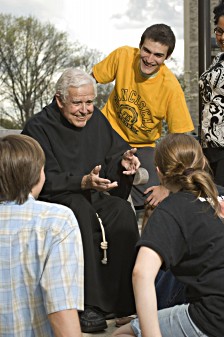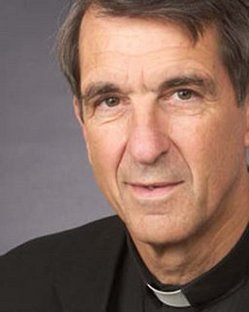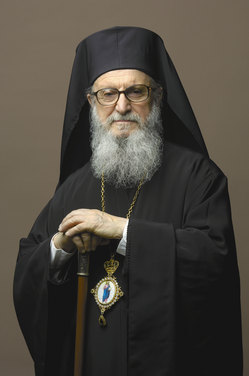
Recently in Catholic Higher Education Category

The Catholic University of Lueven, founded in 1425 by Pope Martin V is said to be entering into a process to re-consider their Catholic identity, even to the point of removing the adjective "Catholic" from their title, a news item on the Cardinal Newman Society's webpage said, reporting a Brussels-based news article on October 7.
The university's rector Mark Waer, 59, a trained physican and medical researcher in nephrology and immunology, has reportedly said, "The Catholic message is not appropriate for the university..." after the criticism from Catholics about the granting of the Nobel Prize to the instigator of IVF technology. Waer only began his term as rector of the university in 2009.
The University's mission statement can be read here.
UK's The Tablet ran a news piece today saying the seminary for the North of England dioceses, Ushaw College, is closing at the end of the school year in June 2011. Currently, 7 English dioceses are served by UC. Ushaw was first founded in Douai, France in 1568 and has been located four miles west of Durham City since 1808.
From its heyday of 400 men studying for the priesthood to 26 today, the Ushaw has a staff of 62.
The story of Ushaw is grim and it sounds like St Joseph's Seminary (Dunwoodie) which has fewer than 25 seminarians for the secular priesthood. For the time being SJS is working alone and is slated to merge with Huntington's seminary.
The Catholic school system in the US has been in a very desperate shape for years: acute and chronic money problems, lack of good, solidly trained Catholic teachers and administrators, a coherent vision of Catholic education as it interfaces with the charism of the religious order/diocese operating the school, building & grounds in near of repair, low endowments, etc. Then there is the assessment of what is purported to constitute a Catholic school: poor formation in the faith, the arts & humanites and science suffer, good use of current technologies, and engagement with people who do things differently, engagement with the vulnerable and culture of life, etc. Many, many Catholic schools don't offer the Sacrifice of the Mass on a weekly basis for the students; and very few of them that I am familiar with offer reliable guidance and formation of the faculty and parents. In my book, if the bishop rarely shows up and the pastor visits the school only when there is crisis. then the problem is more acute.
Don't get me wrong: I am a product of a lot years Catholic education and wouldn't trade it for anything. I love my time in the Catholic schools I attended but I can see the gaping holes in education and experience. I also believe that the Church needs excellent schools and formation programs.
Five exceptions to this critical view may be the five schools in the Diocese of Bridgeport recently named "Blue Ribbon" by the US Dept of Ed. But for these success stories in Catholic Education there are thousands of others pointing to major problems.
Today, there is an article in Time that speaks to a corrective of what is noted above. The dynamic Mr. Ekicsen is asking the right questions and seeking reasonable solutions. The bishop of Patterson made an excellent choice in hiring Eriksen and I pray his project thrives. It will --the saints are behind him. Read about the Eriksen initiative...
I think of a few things that are contributing to a renewal of Catholic eduation in the US: 1) Luigi Giussani's The Risk of Education; 2) the Ed Conference; 3) UND's ACE program; and 4) Dwight Longenecker's booklet The Risk of Faith; 5) Catechesis of the Good Shepherd. This is not an exhaustive list by any stretch of reality because I know there are plenty of more good programs/schools out there so please forward the names to me.
 As it's reported in a few places, Jesuit Father Joseph Fessio, the well-known and gifted teacher and leader was fired by Ave Maria University. The matter of his dismissal revolves around all things, financial matters of the university. Something mentioned here before. So, one must ask if the university is going to be able to make it in the long haul or is the pizza man's dream over. All are called upon to pray for the Holy Spirit's guidance for Father Fessio and, of course, for Ave Maria who once again makes an imprudent decision just because someone disagrees with their philosophy. Sounds like the roundheads are at it again. Read the news article on this event. Father Fessio's email follows:
As it's reported in a few places, Jesuit Father Joseph Fessio, the well-known and gifted teacher and leader was fired by Ave Maria University. The matter of his dismissal revolves around all things, financial matters of the university. Something mentioned here before. So, one must ask if the university is going to be able to make it in the long haul or is the pizza man's dream over. All are called upon to pray for the Holy Spirit's guidance for Father Fessio and, of course, for Ave Maria who once again makes an imprudent decision just because someone disagrees with their philosophy. Sounds like the roundheads are at it again. Read the news article on this event. Father Fessio's email follows:
Tonight's TV
news on NBC drew the world's attention to the fact that Mary Ann Glendon
declined Notre Dame's famous Laetare Medal that is given at the commencement
exercises in May. By the way, 2009 marks the 126th year of the award. The medal
honors the distinguished work of Catholics; once reserved for the laity now
also given to the clergy and religious. These events have me thinking about the
meaning of these events surrounding the craziness of inviting the US president
who stands contrary to Catholic faith and Professor Glendon who is a faithful
Catholic to be on the same stage.
It seems to me that when you pan the comments of academics at Catholic colleges and university what you don't see is rhetoric about Christ, faith as a way of knowing, truth, the objectivity of the Church, the intersection of faith and reason, etc. What you will find are comments like: "We don't see a conflict with our Catholic identity if we have a speaker on campus who may have views that are in conflict with Catholic teachings. We consider the contributions the speaker has made to society as a whole, and that doesn't necessarily mean we endorse all of their positions or views. We're committed to a Jesuit tradition, which doesn't suppress educational issues and intellectual debate," said Kristine Maloney, a spokeswoman for the College of the Holy Cross in Worcester, MA. But Ms. Maloney fails to understand that this type of forum gives credence of equality to contrary views to Catholic faith. Obama's speech is a monologue not a dialogue.
Or, let's take the president of Trinity Washington University's Patricia McGuire who reminds us that Catholics have long struggled to get a place of respectability in the market place of ideas and that to blindly follow the bishops would simply be parochial. In her estimation, "The diminishment of the idea of the university by [some critics] betrays two centuries of intellectual advancement and real leadership by Catholic higher education in this nation." Really, I don't think it is narrow-minded to stand with the Church I profess to believe in and follow unto my salvation in Christ.
Let's just take the Jesuit college's perspective since there are far more people memorized by the so-called Jesuit tradition realizing neither the history nor the aim of Jesuit, Catholic education. Let's remember what many faculty members said at the last search for a Holy Cross College president: we don't want a lay person as president because he or she might make the College too Catholic; a Jesuit is freer to allow us to think and act the way we want. Hence, what you see embedded in Ms. Maloney's remarks about the Jesuit intellectual life of the university is true now but historically that same Jesuit intellectual tradition followed Christ unconditionally because it was rooted in the Spiritual Exercises. In fact, contemporary Jesuit apostolates are said to exist "To follow Christ bearing his Cross means announcing his Gospel of hope...." Jesuit institutions stood for faithfulness to the Gospel, to Church teaching and the dignity of the human person. The Jesuit educational apostolate explored the limits of faith and reason but always came back to faith as the mother of virtue and true knowledge. In a former time there was not a capitulation to secular values that divorces Christ from reality, that removes the Church from the public square or merely wants to fit-in at all costs.
I fail to see why fitting-in is a value for academics at Catholic institutions: theirs is a quest for the reasonableness of Truth. Being like the professors in secular universities in my estimation is a failed enterprise and one that has lead away from Jesus Christ as Savior and reality. True to the Ignatian heritage of Jesuit educational institutions it would be good if Holy Cross College and 27 other Jesuit colleges and universities did the Examen according to the mind Saint Ignatius of Loyola asking the Lord for the grace of conversion while attempting to live in "that harmony with the Magisterium which avoids causing confusion and dismay among the People of God" (Benedict XVI to the Jesuits, 2008)
Many US Catholics seem comfortable with beige Catholicism and a theology based on sentiment. There is no arguing otherwise given Notre Dame's honoring of President Obama and now the growing list of "Catholic" institutions of higher learning caving to political pressure and respectability with no significant outcry from the bulk of 60 million Catholics in the US. When encountering Saint Peter at the heavenly gates I hope the academics don't get offended if Saint Peter has a different view on what it means to be a Catholic and to labor at a Catholic higher educational institution. Let's be clear: Christ didn't come to found a Catholic university--He came to bring us to the Father with the distinct claim that He, Christ, is the way, the truth, and the life. Anything short of that is nonsense.
In world where clarity of Catholic faith is "normal" Catholic education would not afraid of differing theological or philosophical positions, especially those that may run contrary to orthodox Catholic teachings; in fact, a Catholic ought to be respectful of what others have to say, always proposing the Gospel and the Church teaching as true and a place of encounter with Christ. Having said this, a platform at a Catholic institution needs to sensitively, yet firmly follow Christ and the teachings of His Church. Clearly, playing footsy with positions contrary to the Church cannot not be presented as equally valid to what the Church holds or teaches!
Let's not grow faint of heart by following Christ and keeping in mind the motto of the Laetare Medal: Magna est veritas et prevalebit (Truth is mighty, and it will prevail).
Mary Ann Glendon has declined the Laetare Medal given by the University of Notre Dame.
I believe this is the type of witness to Jesus Christ we hunger for from the depths of our heart.
Read her letter to Father Jenkins here.
 The President of Fordham University, Fr. Joseph M. McShane, S.J. announced Tuesday Feb. 17, a Jaharis Family Foundation gift establishing the Archbishop Demetrios Chair in Orthodox Theology and Culture as part of the Orthodox Christian Studies Program of this renowned Roman-Catholic Jesuit University.
The President of Fordham University, Fr. Joseph M. McShane, S.J. announced Tuesday Feb. 17, a Jaharis Family Foundation gift establishing the Archbishop Demetrios Chair in Orthodox Theology and Culture as part of the Orthodox Christian Studies Program of this renowned Roman-Catholic Jesuit University.
The announcement came at the conclusion of the Sixth Annual Orthodoxy in America Lecture given this year by Fr. Stanley Harakas, ThD, who is the Archbishop Iakovos Professor of Orthodox Theology Emeritus at Holy Cross Greek Orthodox School of Theology. Fr. Harakas' topic "The Future of Orthodox Christianity in
Following the lecture President McShane announced the establishment of the Archbishop Demetrios Chair in Orthodox Theology and Culture through a generous donation of two million dollars by the Jaharis Family Foundation. Fr. McShane welcomed Michael and Mary Jaharis as he expressed his great joy and gratitude. He further said that naming the chair after Archbishop Demetrios is a most deserving honor and that the University was "thrilled that his name (the Archbishop's) and the name of the Jaharis family will forever be associated with Fordham."
A new independent report on college costs published by The Center for the Study of Catholic Higher Education--the research division of The Cardinal Newman Society--reveals that some of the most faithful Catholic colleges and universities in the United States also offer students significant cost savings.
Among the study's key findings:
· Average tuition for students at the recommended faithful Catholic colleges is about $3,000 less than at other Catholic colleges and about $1,000 less than the average private college.
· The Newman Guide colleges provide students a larger portion of institutional aid (39%) than the average private college (29%).
· Students at the recommended Catholic colleges graduate with fewer loans and less debt--on average, about $2,000 less than at private colleges and $1,400 less than other Catholic colleges.
The study was conducted by Andrew Gillen, Ph.D., a leading expert on college affordability issues and the research director of the Center for College Affordability and Productivity. The study is available online at TheNewmanGuide.com.
The recommended Newman Guide colleges are Ave Maria University, Aquinas College (Tenn.), Belmont Abbey College, Benedictine College, The Catholic University of America, Christendom College, The College of Saint Thomas More (Texas), DeSales University, Franciscan University of Steubenville, Holy Apostles College & Seminary, John Paul the Great Catholic University, Magdalen College, Mount St. Mary's University, Our Lady Seat of Wisdom Academy, St. Gregory's University, Southern Catholic College, Thomas Aquinas College, The Thomas More College of Liberal Arts (N.H.), University of Dallas, University of St. Thomas (Texas), and Wyoming Catholic College.

